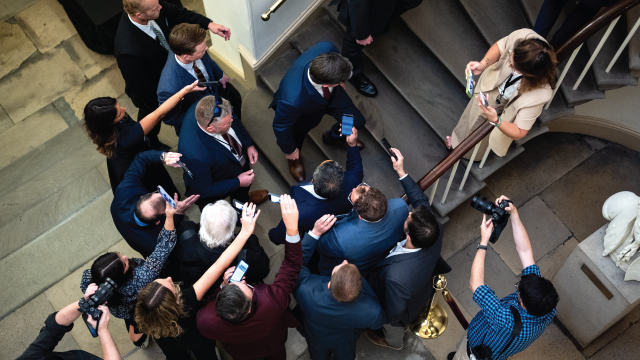
As they have for the past four decades, most Americans say criticism from news organizations keeps political leaders from doing things they shouldn’t, according to a Pew Research Center survey conducted in September 2024.
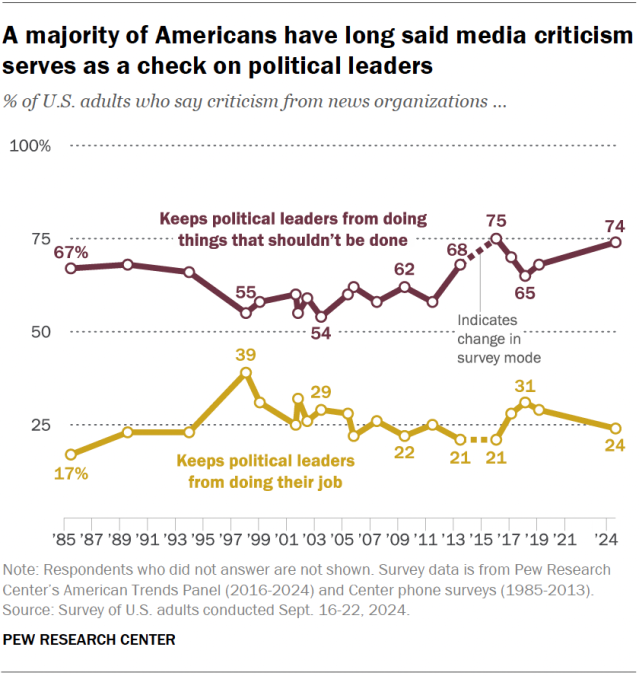
But Republicans’ and Democrats’ views on this question often shift depending on which party controls the White House. And Republicans became much more skeptical about the media’s so-called “watchdog role” during President-elect Donald Trump’s first term.
Pew Research Center has been asking Americans about the news media’s role in investigating and reporting on public officials to hold them accountable since the mid-1980s. That was about a decade after The Washington Post’s coverage of the Watergate scandal contributed to President Richard Nixon’s resignation in 1974.
Pew Research Center conducted this analysis to better understand Americans’ attitudes toward the news media and how they are changing over time.
The survey of 9,680 U.S. adults was conducted Sept. 16-22, 2024. Everyone who completed the survey is a member of the Center’s American Trends Panel (ATP), a group of people recruited through national, random sampling of residential addresses who have agreed to take surveys regularly. This kind of recruitment gives nearly all U.S. adults a chance of selection. Surveys were conducted either online or by telephone with a live interviewer. The survey is weighted to be representative of the U.S. adult population by gender, race, ethnicity, partisan affiliation, education and other factors. Read more about the ATP’s methodology.
Here are the questions used for this analysis, the topline and the survey methodology.
Pew Research Center is a subsidiary of The Pew Charitable Trusts, its primary funder. This is the latest analysis in Pew Research Center’s ongoing investigation of the state of news, information and journalism in the digital age, a research program funded by The Pew Charitable Trusts, with generous support from the John S. and James L. Knight Foundation.
How Democrats and Republicans view the media’s watchdog role
In our most recent survey, conducted two months before the 2024 U.S. presidential election, about three-quarters of Americans (74%) said criticism from news organizations keeps political leaders from doing things that shouldn’t be done, while far fewer (24%) said this type of scrutiny keeps leaders from doing their job. The last time such a large share of Americans expressed the view that media criticism helps hold political leaders accountable was in 2016, just before Trump was elected the first time.
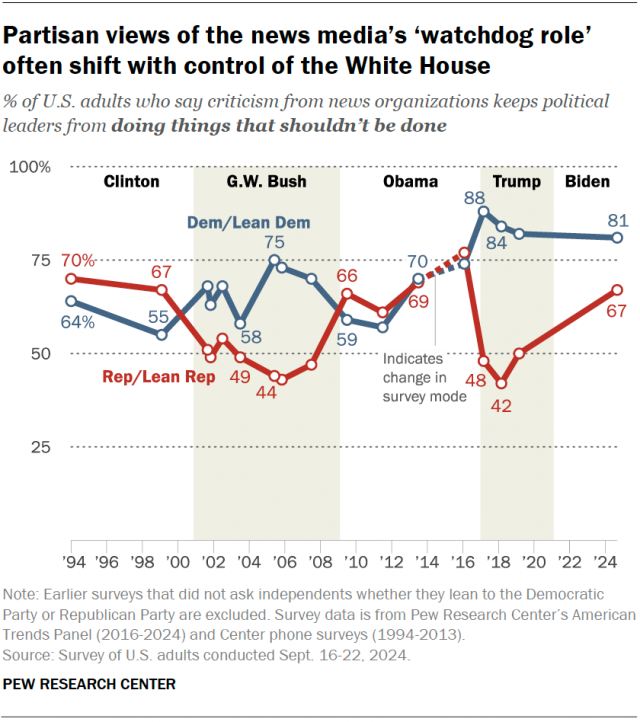
In the new survey, 81% of Democrats and Democratic-leaning independents say media criticism helps keep political leaders from doing things they shouldn’t. Two-thirds of Republicans and GOP leaners say the same.
In the past, however, partisan attitudes have changed notably following presidential elections.
Just after Trump’s election in 2016, for example, Republicans became much less likely to say criticism from news organizations keeps political leaders from acting inappropriately. A similar pattern appeared during President George W. Bush’s administration.
Just before the 2016 election, 77% of Republicans said media criticism keeps political leaders from doing things they shouldn’t. But that figure fell to 48% in 2017 to and 42% in 2018 – half the share of Democrats (84%) who said this in 2018.
Do Americans think news coverage is fair to all sides?
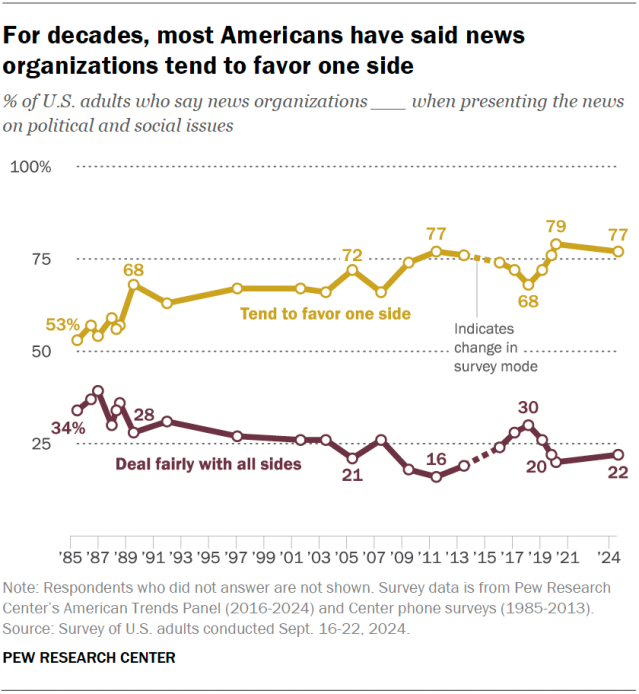
Our September survey also asked Americans whether they see the news media as generally fair to all sides when reporting on politics and social issues, or if they think the media tend to favor one side.
In 2024, about three-quarters of U.S. adults (77%) say news organizations tend to favor one side when presenting the news on political and social issues. Far fewer (22%) believe news organizations deal fairly with all sides.
In surveys going back almost 40 years, most Americans have viewed news coverage as biased toward one side. But the share of Americans who say so is near the highest it’s been since we first asked this question in 1985.
Perceptions of media fairness vary widely by party
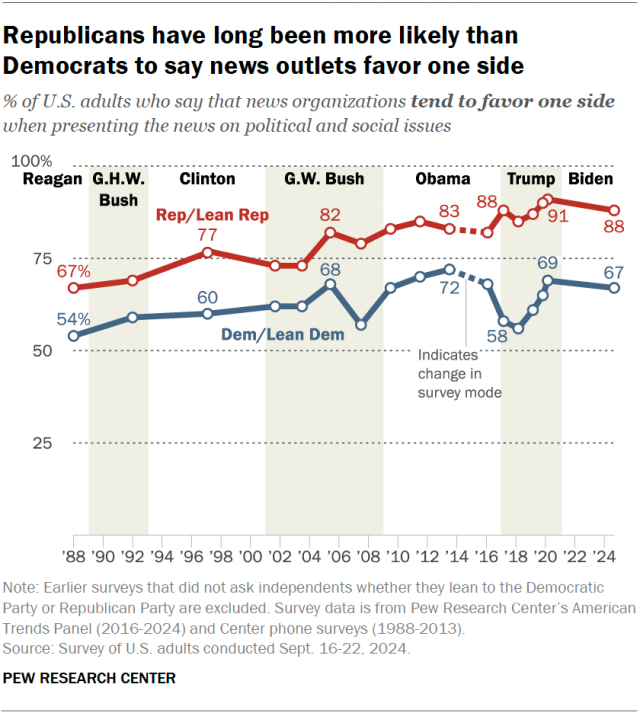
Republicans have long been more likely than Democrats to think news coverage favors one side, though both parties have largely seen it this way.
In the September survey, about nine-in-ten Republicans (88%) say news organizations tend to favor one side when presenting the news on political and social issues, compared with 67% of Democrats.
These partisan views are similar to where they were the last time we asked this question in early 2020, in the final year of Trump’s first term.
Note: Here are the questions used for this analysis, the topline and the survey methodology.
